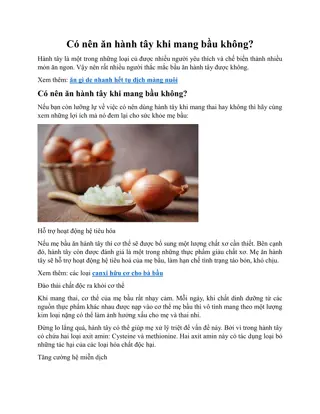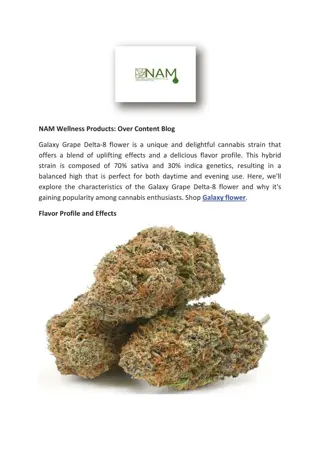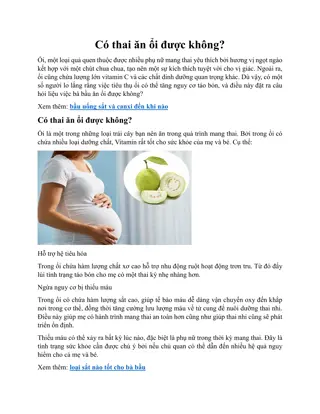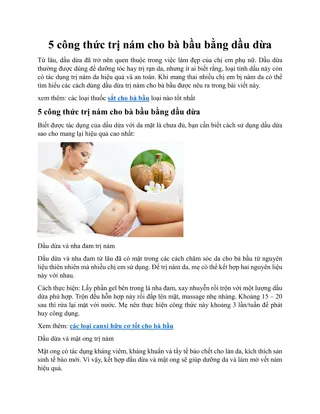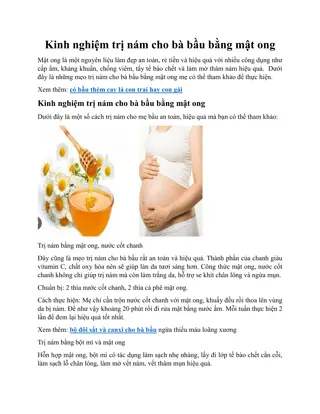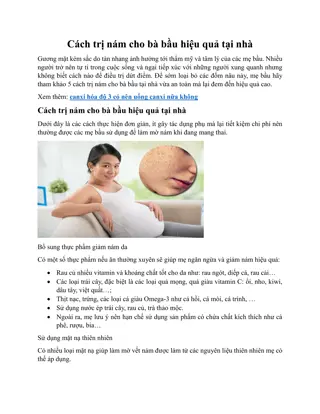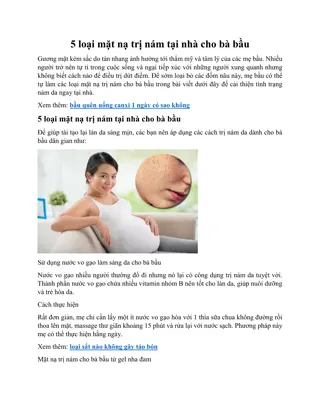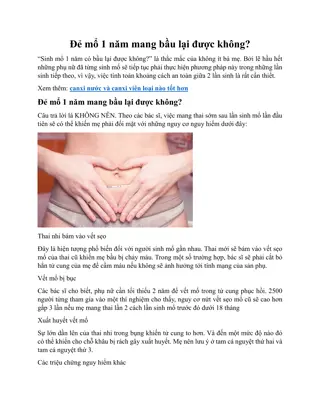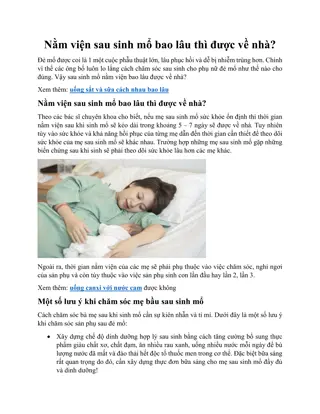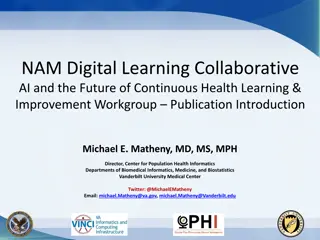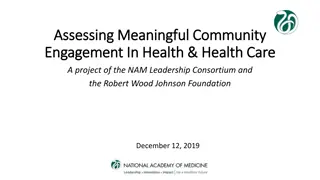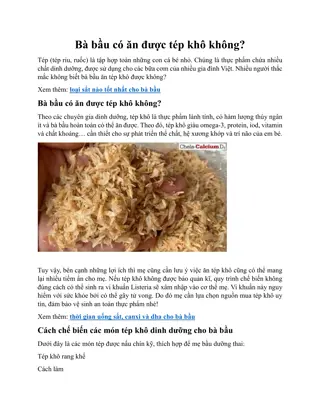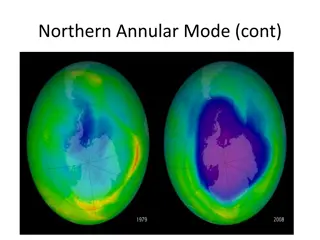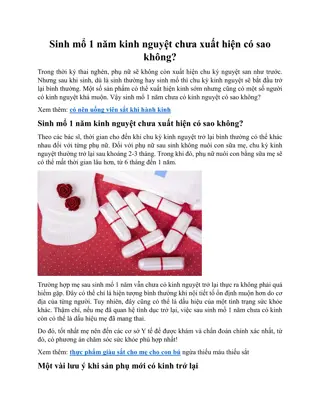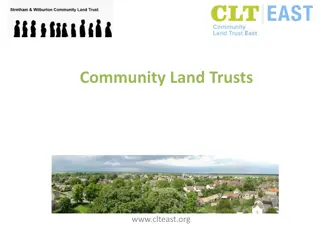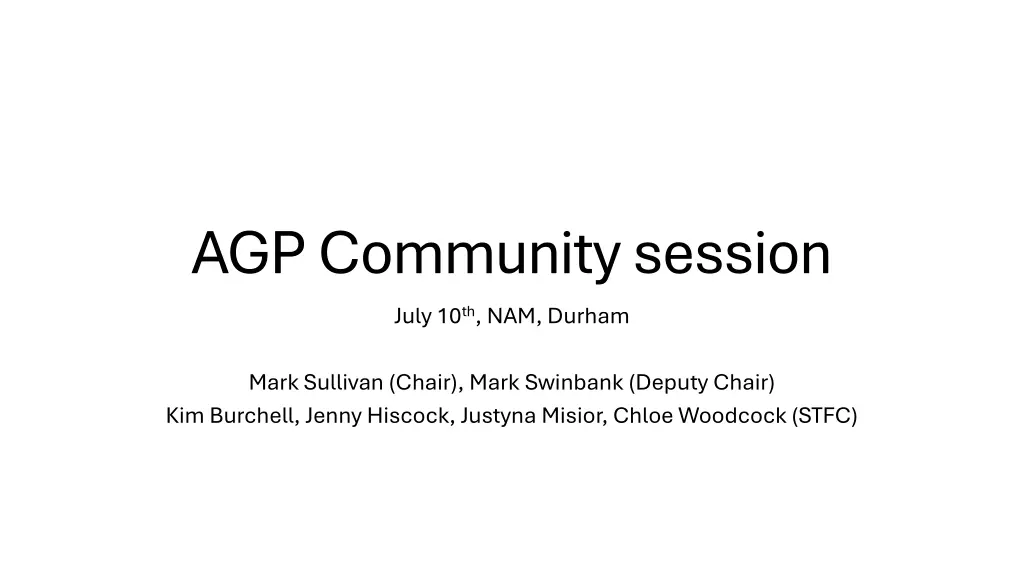
Astronomy Grants Panel Overview and Engagement Details
Discover the role of AGP in peer reviewing astronomy applications for STFC grants, with insights into community sessions and upcoming events. Join the engagement and stay updated on astronomy research.
Download Presentation

Please find below an Image/Link to download the presentation.
The content on the website is provided AS IS for your information and personal use only. It may not be sold, licensed, or shared on other websites without obtaining consent from the author. If you encounter any issues during the download, it is possible that the publisher has removed the file from their server.
You are allowed to download the files provided on this website for personal or commercial use, subject to the condition that they are used lawfully. All files are the property of their respective owners.
The content on the website is provided AS IS for your information and personal use only. It may not be sold, licensed, or shared on other websites without obtaining consent from the author.
E N D
Presentation Transcript
AGP Community session July 10th, NAM, Durham Mark Sullivan (Chair), Mark Swinbank (Deputy Chair) Kim Burchell, Jenny Hiscock, Justyna Misior, Chloe Woodcock (STFC)
Today is part of wider AAP/AGP engagement with the community STFC Astronomy Grants Panel Community Session now (Thu 10 July 2025 13:15) STFC Community Session next (Thu 10 July 2025 14:15) AAP/AGP Town Hall 16th July 2025 14:00 (zoom) AAP/AGP Autumn Town Hall (Sep/Oct TBC) To receive the latest astronomy updates, sign up to the astro community mailing list by sending an email to astrolists@stfc.ac.uk
Outline Who are the AGP and what do we do AGP funding opportunities and remit Assessment criteria Updates on 2025 round Reflections on schemes, and Q&A
Who are the AGP? STFC Office Team: Chloe Woodcock (AO/AT), Justyna Misior (SS/PL), Kim Burchell, Jenny Hiscock AGP: Astronomy Observation (AO) Rita Tojeiro (Chair) St Andrews Heather Cegla Warwick Kenneth Duncan Edinburgh Matt Nicholl QUB Noelia No l Surrey Nicolas Peretto Cardiff AGP: Solar Studies & Space-based STP (SS) Rob Fear (Chair) Southampton Anne-Marie Broomhall Warwick Andrew Hillier Exeter Natasha Jeffrey Northumbria 30 panel members ~33% rotate each year AGP: Planetary Studies (PL) Lydia Hallis (Chair) Glasgow Nicholas Achilleos UCL Matt Balme Open Beatriz Sanchez-Cano Leicester AGP: Astronomy Theory (AT) David Mulryne (Chair) QMUL Adrian Barker Leeds Rob Izzard Surrey Raphael Hirschi Keele Zoe Leinhardt Bristol Robert Smith Sussex Annual opportunity to join AGP: Large Awards Panel Mark Swinbank (Chair) Rita Tojeiro (Deputy Chair) Tessa Baker Portsmouth Vanessa Graber RHUL Ian McCarthy LJMU Danny Steeghs Warwick Amaury Triaud Birmingham + Nicholas Achilleos, Rob Fear, Zoe Leinhardt, David Mulryne 24 institutes represented AGP: Technology Experts Robert Harris Durham Matthias Tecza Oxford Hui Wang RAL Membership always available online Mark Sullivan (Chair) - Southampton Mark Swinbank (Deputy Chair) Durham
What the AGP does The AGP performs Peer Review of astronomy exploitation applications to STFC (Small and Large Awards) (eligible community likely ~700-800 researchers) We collectively recommend prioritised rank orders for Small Award and Large Award applications received each year We determine the grant review process, in consultation with the community We provide reports to STFC s Science Board (PPAN), the UK Space Agency (UKSA) Discovery Advisory Committee for Science (DACS), and usually a community report o On the process/statistics and policy issues arising o But not on individual applications
What the AGP does not do The AGP does not make funding decisions (as we don t hold the budget) We do not enact our recommendations (our ranked list) o o SB/DACS endorses (or not) our recommendations They then go to the STFC Executive to act (or not) on them. We do not set the budget: STFC (UKRI) does this o But we do report on the effect of a given budget We do not set grants policy o UKRI/STFC do this - but they can ask for our advice / suggestions ( )
The AGP Process: top level Two Small Award calls covered by two pairs of sub-panels: SS: Solar Studies & Space-based Solar-Terrestrial Physics PL: Planetary Studies and AT: Astronomy Theory AO: Astronomy Observation (inc. Technology Experts) SS/PL and AO/AT meet separately and make ranked lists of proposals One Large Award call covered by the Large Awards Panel. Invitation only. Invites determined by a sift panel based on outline applications (sift process runs Oct-Dec) All applications sent out for community reviewing, applicants respond to review Panels rank applications -> STFC Office (funding line) -> SB/DACS -> Executive
Remit funding to support theory, including modelling, simulation and related software development, observation, experiment and new technology research, relevant to All* aspects of the solar system (SS/PL) All* aspects of astronomy and astrophysics beyond the solar system (AO/AT) blue skies technology or instrumentation development applicable to those areas: technology readiness levels (TRL) 1 to 4 * with some exceptions
Not in remit Technology development that goes beyond TRL 4 (early R&D, non-mission specific) Modest upgrades to equipment where research is delivered with the grant, may be considered Telescope and instrument operations costs, where not directly linked to specific science outcomes within the grant period Some aspects of Gravitational Wave research (there are separate GW CGs) Space weather: NERC funds solar terrestrial physics where the primary goal is to understand the Earth s environment out to the upper atmosphere Support for space science is delivered through the UKSA for project build activities, and through AGP for mission science exploitation.
Small Awards (up to) Three-year awards No financial limit, but limits on resource levels: Max 20% combined Applicant FTE Max one 3-year RIA (or equivalent) In addition, can request technician support, travel, equipment, consumables Demand Management: Applicants can be on up to 2 applications per round, but only one as Project Lead (PL), subject to: Unsuccessful PLs locked out for one round from acting as PL (but can still be co-lead on two per year) PLs cannot have overlapping Small Awards (but can still be co-lead on two per year)
Large Awards (up to) five-year awards: large projects tackling big research questions or technology development with the potential to produce world-leading research. Uses an EoI/outline round ( sift ), prior to invitation to full application No financial limit, but some limits on resource levels: RIA effort can be from 3x3-year up to 5x5-year (9 to 25 RIA years) No limit on Applicant FTE Can request technician support, travel, equipment, consumables Demand Management: Decoupled from Small Awards Applicants cannot hold overlapping LA funding Applicants can only submit one EoI/outline per round
Typical AGP review timeline Difficult to squeeze the timeline! e.g., for Small Awards: STFC office checks and reviewer selection by panellists, typically takes a month [March] Organising ~700 reviews, and then Applicant responses, typically takes 2-3 months [April, May, June] Panellists need minimum 2 months to read material, out of university term time [June, July, August] The three panel meetings and finalising outcomes takes about a month [September] So: deadline+7 months until final ranking lists are agreed and AGP work is concluded Then endorsement from SB&DACS, and authorisation to commit from STFC executive UKRI Funding Service (TFS) has added to workload for applicants, panellists and the STFC office e.g., AOAT has >2000 pages of material to review for the 2025 round
Reviews Your community reviews are a critical part of the process If you wrote one of the ~700 reviews this year: Thank you! If you receive an email, please respond to it. If you cannot do it, no problem: please let us know Chasing reviews delays the process: every proposal must have a minimum number of reviews The AGP depend on high-quality, thoughtful reviews and the overwhelming majority are just this Short reviews (equivalent to This is great or This is rubbish ) are not helpful The best reviews provide clear, evidenced lists of strengths and weaknesses
Assessment criteria Vision (importance of the proposed work) Approach (feasibility of the proposed work) Applicant and team capability to deliver (appropriate to career stage) Resource and cost justification Risk management Ethics and responsible research and innovation (RRI)
2025 round currently in progress We received 241 Small Award Proposals in 2025 (173 AO/AT, 68 SS/PL)). cf. 159 in 2024 Small Award round; 174 in 2023 Historically a high number: comparable to the 249 Projects in 2020 CG round, 255 in 2017 There was a pool of ~390 eligible applicants: ~38% have chosen not to apply as PL 48% in 2024, 30% in 2023 We have received 9 Large Awards, as expected (9 were invited to apply following EoIs)
2025 round slipped starts As already announced to applicants and the STFC community: Successful Small Awards will start on October 1st 2026 (slipped from April 1st 2026) Successful Large Awards will start no earlier than April 1st 2027 There will be no Large Awards call in 2026, and therefore no EoI call this Summer/Autumn The AGP will be assessing applications as written according to the original start date
Lots of application guidance online Lots of information on what the panel are looking for and the detailed assessment criteria If in doubt, please email and ask the STFC Office team TFS does not allow the team to return applications for amendment!
General reflections on the schemes Successes SAs and LAs generally seen by community as positive: shorter lock-out, no forced 3-year cycle Substantial evidence PLs are waiting to apply until the timing is optimal Multi-institution proposals now more possible/popular (10% of SAs in 2023&2024) LAs can in principle mirror significant STFC/UKRI investment in major projects Challenges Budgets under pressure: e.g., new grants worth 7.5M in 25/26 (cf. 12.7M in 24/25) University costs are rising fast: Typical grant was 147k/year in 2023, and 158k/year in 2024 (up 7%) LAs are significant 5-year financial commitments Unclear whether a return to 2022/2023 funding levels is possible
Rejects Reject: The application has not been accepted for one or more reasons It is not necessarily a judgment on proposal quality! Example: Funding overlap AGP welcomes applications from applicants who have funding from other sources BUT It is the responsibility of applicants to demonstrate their projects are clearly distinct from (i.e., lie well outside the remit of) their other funding. Applicants with other funding often find this challenging, as they must make the case that their proposed research is of the highest scientific priority, but also explain why the research is not covered by their existing funding, often in a similar research area.
Resource and cost justification Small and Large Awards are all or nothing so resources and costs form part of the assessment criteria Request what you need, but everything must be justified and project specific UKRI wide: Applicants must demonstrate how the resources requested: are comprehensive, appropriate, and justified represent the optimal use of resources to achieve the intended outcomes maximise potential outcomes and impacts Justify all your cost requests; don t leave the panel guessing What specifically will the Applicants be doing? Why do you need the FTE? If you have staff beyond RIAs and Applicants, what will they be doing? Is it project specific? If requesting supercomputer or telescope time, why can national facilities not be used?
Terminology S Small Award mall Award applications are for a single project Large Award Large Award applications are for large cross-cutting projects project projects Each application has an overall Project Lead Leads Leads (aka Co Co- -Is Is) (collectively, Applicants Project Lead (aka PI PI) and potentially other Project co Applicants ), based at the same or different institutions Project co- - P Projects rojects request resources Research and Innovation Associate (aka PDRA) effort Technician effort Applicant effort Travel/computing/equipment/consumables/visiting scientists/Other DI costs (PhD studentships are not eligible under the AGP Schemes) resources for some of the following:


